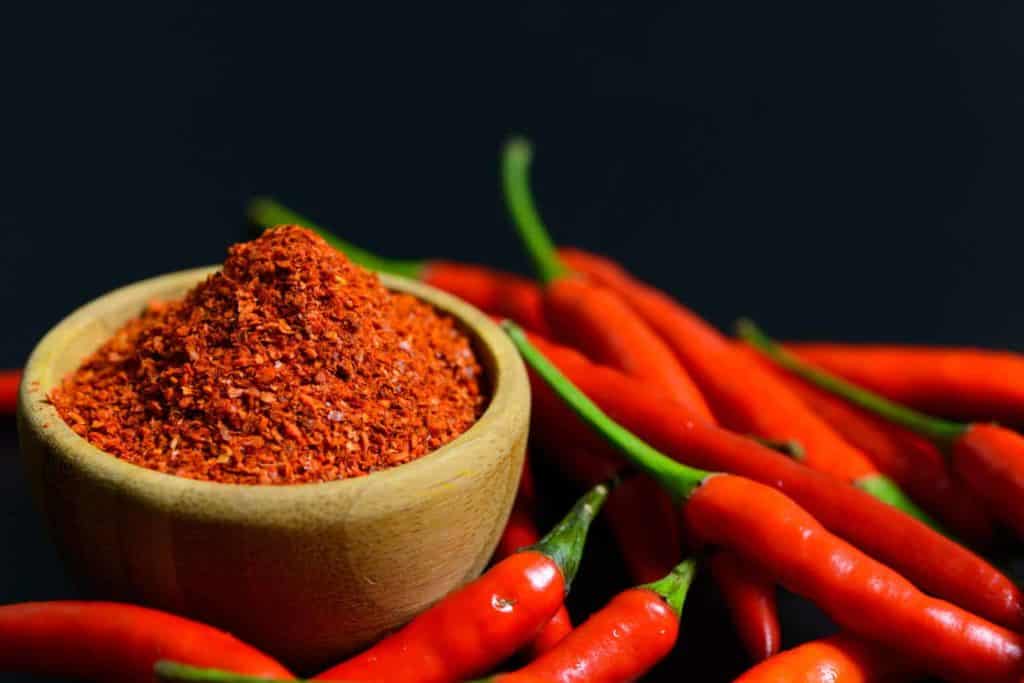Many cultures have a history of using cayenne pepper for their amazing and versatile benefits. Cayenne pepper has been used for a range of illnesses, including fever, indigestion, flatulence, tremors, gout, menorrhagia in women, sore throats, hemorrhoids, tonsillitis, scarlet fever, nausea, and so much more. Today we’re going to explore some of the reasons why cayenne pepper should be present in your healthy diet plan.
What Are Cayenne Peppers?

Cayenne pepper is a type of chili pepper. They are part of the nightshade family of flowering plants and are cousins to bell peppers and jalapeños.
Originally grown in South America and brought to Europe in the 15th century by famous explorer Christopher Columbus, cayenne peppers have been used in several regional styles of cuisine, as much as they have been used medicinally. These magical (sort of) peppers carry an extraordinary nutritional profile, which includes many antioxidants that are beneficial for your health. Five grams of cayenne pepper contains:
- Calories: 17
- Fat: 1 gram
- Carbs: 3 grams
- Fiber: 1.4 grams
- Protein: 0.6 grams
- Vitamin A: 44% of the RDI
- Vitamin E: 8% of the RDI
- Vitamin C: 7% of the RDI
- Vitamin B6: 6% of the RDI
- Vitamin K: 5% of the RDI
- Manganese: 5% of the RDI
- Potassium: 3% of the RDI
- Riboflavin: 3% of the RDI
What exactly makes this ingredient so special? Capsaicin, the active component in cayenne peppers, is what gives them their superb therapeutic properties. It also supplies them with their spicy taste. In fact, how spicy a dash of cayenne pepper depends on its capsaicin content. The more capsaicin it contains, the spicier it is. Here are 17 amazing benefits of cayenne pepper.
Health Benefits of Cayenne Pepper
Anti-Irritant Properties
Various tissues in your body can be irritated for a plethora of reasons — illness, diet, external toxins, just to name a few. Unsurprisingly, cayenne can help “put out fires” and ease an unsettled stomach and even a sore throat.
Relieves Congestion
Many Americans have to deal with stuffed up sinuses due to cases of flu or allergies. Cayenne pepper promotes flow by breaking up and moving clogged mucus.
Combats Virulent Organisms
When it comes to protection against toxic organisms, think of cayenne pepper as a remedial flame thrower. Studies reveal that CAY-1, a compound found in cayenne peppers, contained the growth of 16 separate fungal strains while remaining non-toxic to vital cells.
Headache Relief
Cayenne’s ability to relieve headaches may be linked to the pepper’s ability to tap into pain receptors in different areas of the body and relieve headaches when they hit.
Digestive Support
Cayenne is a famous digestive helper. It stimulates the digestive tract, boosting the flow of enzyme production as well as gastric juices. This helps the body’s ability to metabolize food. Furthermore, Cayenne pepper is also effective in relieving intestinal gas by stimulating intestinal peristaltic movement, aiding in both digestion and elimination.
Anti-Inflammatory Properties
Many illnesses induce inflammation throughout the body. Cayenne’s ability to mitigate systemic cellular irritation makes it an excellent ingredient for maintaining long-term good health.
Helps Generate Saliva
Cayenne drives the creation of saliva, an important element of digestion and oral health preservation.
Supports Cardiovascular Health
Cayenne pepper promotes cardiovascular health by supporting blood vessels and normal blood viscosity. When both of these variables are healthy and working, the risk of severe cardiac incidents is greatly diminished.
Detox Support
Cayenne incites the circulatory system and improves the pulse of lymphatic and digestive beats. Cayenne also causes sweating — another essential process of detoxification. Tip: Mixed with honey and lemon juice, cayenne tea is an exceptional morning drink for promoting detoxification.
Relieves Sporadic Joint Pain
Remarkably high in capsaicin, cayenne pepper carries chemical agents from the skin into the joint, allowing relief for joint discomfort. For this reason, many people with sore or stiff joints use creams that include cayenne.
Great Preservative
Cayenne is a great preservative and has been used to prevent food poisoning from harmful bacteria.
Supports Longevity
A comprehensive study found that people who ate spicy foods had a 14% probability of living longer than those that didn’t. Furthermore, researchers also found that regular eating of peppers aligned with decreased percentages of death from respiratory infirmities or heart conditions.
Promotes Healthy Body Weight

A comprehensive study found that people who ate a meal that contained cayenne peppers for breakfast consumed fewer calories throughout the day. Cayenne is also a fantastic metabolic booster and helps the body in getting rid of excess fat.
Treatment for Toothache
When applied directly to the affected area, cayenne may help relieve the discomfort of a sore tooth.
Topical Solution
Cayenne-based topical solutions have been used for incidents such as snake bites, bursitis, cuts, wounds, and lower back pain.
Tastes Amazing!
Those with sensitive palates may differ, but many individuals find that a pinch of cayenne pepper can add a spicy kick to otherwise dull foods.
Takeaway
Cayenne peppers have many health benefits mainly thanks to their active component, capsaicin. They may reduce your appetite and help with your digestive problems, among many other great benefits. For most people, cayenne peppers are a great way to add flavor to their diet. If you are a spicy food enthusiast, you need to have cayenne pepper in your cabinet or you can grow at home, ready for when you want to kick up your afternoon meals or spice up your morning eggs. Even a dash can make a recipe better.




